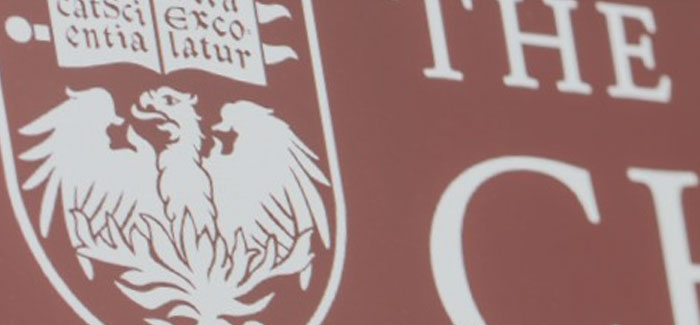
Dialogo reports on 2009 graduate student placement.
At the beginning of the 2008–2009 academic year, Cassie Fennell, AM’03, PhD’09, was an anthropology doctoral candidate who thought that entering the academic job market might have to wait. She was working to complete her dissertation by December, and she wasn’t sure there would be job openings to apply for even if she had the time. “The market was especially tight this year, and in any year it can be difficult for anthropologists who work in the United States as opposed to areas more typically associated with the discipline,” she says. “I decided that I was not going to apply for any positions unless the listing specified that they wanted someone who did work in the United States.” When five or so listings appeared, she decided to apply for them all and by April had accepted a tenure-track assistant professorship at Columbia University.
Fennell and other doctoral candidates across the Division went on the job market during last year’s economic crisis and prevailed nonetheless. Reports gathered by Dialogo reveal that fledgling scholars from each department landed plum assistant professorships, postdoctoral fellowships, and other positions for the 2009–2010 academic year. (The right sidebar shows two or three placement examples from each department.)
On the flip side, departmental administrators note that some excellent students did fall prey to the poor economic climate, either missing out on their first-choice positions or coming up empty-handed altogether. A number in the latter category have yet to graduate and will reenter the market this year.
Associate Professor of Political Science and placement director for his department Gerald Rosenberg says, “Given the hiring budgets, we had a stunning year.” Out of the 24 students who went on the market, 19 snagged a tenure-track position or postdoctoral fellowship. Rosenberg quips, “I don’t think one can underestimate luck,” but goes on to note, “Our graduate students look a bit different than students from other institutions. They are more intellectually supple and therefore often more enticing to hiring committees.” According to Rosenberg, faculty help prepare graduate students for the market by encouraging them to participate in departmental job talks, set up practice talks of their own, and attend conferences. “Attending conferences suggests to a potential employer that you’re active in the profession and that you’ve made contacts in the field,” he says. As placement director, Rosenberg holds informational meetings for students who are about to begin the job-search process as well as those who have recently started their doctoral programs: “In a certain sense, meeting with students the spring before they go on the market is four years too late, so every year I meet with students who are not going to be on the market. My aim is to begin with second-year students, letting them know what they need to start thinking about.”
Describing the support she received from the anthropology department, Fennell cites the efforts of departmental administrator Anne Ch'ien and a seminar for job seekers taught by Michael Silverstein, the Charles F. Grey Distinguished Service Professor in Anthropology. “What’s so wonderful about the anthro department is that we have a seminar offered every year and a half or so,” she says. “Students who are close to being on the job market or are on the market will take it and learn how to read a job ad and put together a CV. I took it the spring before I went on the market. And Anne goes above and beyond. She organizes a massive list of job listings; she helps make sure that faculty have written our recommendation letters. I think the fact that many of us have gotten far in the job market is a testament to her dedication.”
While Fennell prepared applications for a handful of positions, Aspen Gorry, AM’06, PhD’09, applied for around 100 positions in the United States and Europe—typical for graduate students in economics. After putting together a job-market packet, applying for postings listed on the Job Openings for Economists Web site, participating in around 30 first-round interviews at the American Economic Association annual meetings, and traveling to seven second-round interviews, he accepted an assistant professorship at UC Santa Cruz in February.
Looking back on his experience, Gorry says that the search was “a full-time job” and speaks to the challenges experienced by all students seeking a position in academia, in a good job market or bad: “Everyone wants to be at a top university, but at any given location they’re only hiring one or two people. You really can’t get your mind set on being in either some specific location or at some specific institution. If you’re graduating as a lawyer, then you can say, ‘I want to live in New York City.’ If you’re an academic, there are only so many universities in New York.”
Where students went: A sampling
Sociology
- Tenure Track (TT), University of Wisconsin–Madison
- TT, Northeastern University National Institutes of Health
- Postdoctoral Fellowship, Princeton University
Political Science
- TT, University of Singapore
- TT, Yale University
- TT, Vanderbilt University
History
- TT, University of Notre Dame
- Visiting Lecturer, Yale University
- Postdoctoral Fellowship, University of Cambridge
Economics
- TT, London School of Economics
- TT, Georgetown University
- TT, Clemson University
Comparative Human Development
- Postdoctoral Fellowship, Brown University
- Postdoctoral Fellowship, University of Virginia
- Visiting Lecturer, University of California, San Diego
Psychology
- Postdoctoral Fellowship, Harvard School of Education
- Postdoctoral Fellowship, Harvard University
- Postdoctoral Fellowship, University of Chicago
Social Thought
- Visiting Scholar, Yale University
- Visiting Research Fellow, University of Richmond
Anthropology
- TT, Bucknell University
- TT, The Wharton School
- TT, University of Toronto–Scarborough
